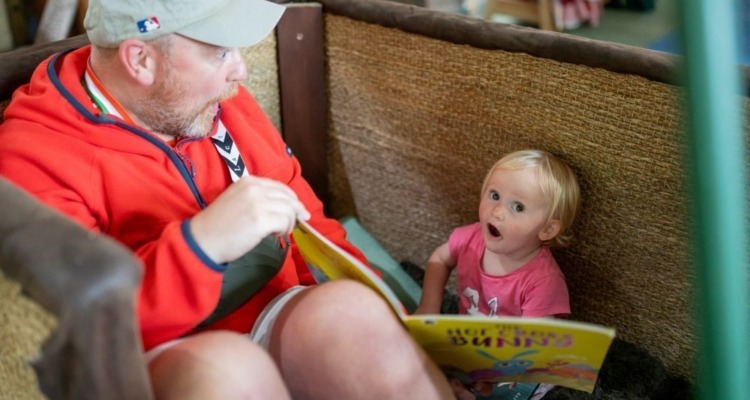Featured Poem: There was a Child went Forth by Walt Whitman
The weekend just gone saw two phenomenons of nature, the most talked-about being that of the solar eclipse. Though we experienced 85% partial eclipse here in the UK, the clouds made it seem rather less spectacular than it really was - a shame, as now we have to wait until September 2090 until the next one. By coincidence, the Vernal Equinox took place on the same day. The arrival of Spring is something we can all take part in whatever the skies overhead look like, though we hope those clouds clear up soon to leave us with more suitable sunshine.
As the seasons change and we get a spring in our step, this poem by Walt Whitman has left us pondering. One of our shared reading groups in Cornwall recently enjoyed it alongside their reading of Great Expectations by Charles Dickens. The Reader Organisation's Reader-in-Residence for Cornwall Sally Sweeney tells us more:
The poem takes you on a journey through nature and through human life. On the page, the constant repetition, at the start of each line, of the words; 'and', 'the' and 'they' can seem a bit clunky at first glance. However, the almost hypnotic rhythm created by those repeated words, and the vast array of images described, make it wonderful to read aloud.
We could have talked about it all afternoon – definitely needs a good 45 minutes to do it justice!
Why not take some time out of your Monday to have a read and relax into what we hope will be a far sunnier week from here.
There was a Child went Forth
There was a child went forth every day;
And the first object he look’d upon, that object he became;
And that object became part of him for the day, or a certain part of the day, or for many years, or stretching cycles of years.
The early lilacs became part of this child,
And grass, and white and red morning-glories, and white and red clover, and the song of the phoebe-bird,
And the Third-month lambs, and the sow’s pink-faint litter, and the mare’s foal, and the cow’s calf,
And the noisy brood of the barn-yard, or by the mire of the pond-side,
And the fish suspending themselves so curiously below there—and the beautiful curious liquid,
And the water-plants with their graceful flat heads—all became part of him.
The field-sprouts of Fourth-month and Fifth-month became part of him;
Winter-grain sprouts, and those of the light-yellow corn, and the esculent roots of the garden,
And the apple-trees cover’d with blossoms, and the fruit afterward, and wood-berries, and the commonest weeds by the road;
And the old drunkard staggering home from the out-house of the tavern, whence he had lately risen,
And the school-mistress that pass’d on her way to the school,
And the friendly boys that pass’d—and the quarrelsome boys,
And the tidy and fresh-cheek’d girls—and the barefoot negro boy and girl,
And all the changes of city and country, wherever he went.
His own parents,
He that had father’d him, and she that had conceiv’d him in her womb, and birth’d him,
They gave this child more of themselves than that;
They gave him afterward every day—they became part of him.
The mother at home, quietly placing the dishes on the supper-table;
The mother with mild words—clean her cap and gown, a wholesome odor falling off her person and clothes as she walks by;
The father, strong, self-sufficient, manly, mean, anger’d, unjust;
The blow, the quick loud word, the tight bargain, the crafty lure,
The family usages, the language, the company, the furniture—the yearning and swelling heart,
Affection that will not be gainsay’d—the sense of what is real—the thought if, after all, it should prove unreal,
The doubts of day-time and the doubts of night-time—the curious whether and how,
Whether that which appears so is so, or is it all flashes and specks?
Men and women crowding fast in the streets—if they are not flashes and specks, what are they?
The streets themselves, and the façades of houses, and goods in the windows,
Vehicles, teams, the heavy-plank’d wharves—the huge crossing at the ferries,
The village on the highland, seen from afar at sunset—the river between,
Shadows, aureola and mist, the light falling on roofs and gables of white or brown, three miles off,
The schooner near by, sleepily dropping down the tide—the little boat slack-tow’d astern,
The hurrying tumbling waves, quick-broken crests, slapping,
The strata of color’d clouds, the long bar of maroon-tint, away solitary by itself—the spread of purity it lies motionless in,
The horizon’s edge, the flying sea-crow, the fragrance of salt marsh and shore mud;
These became part of that child who went forth every day, and who now goes, and will always go forth every day.
Walt Whitman
Share
Related Articles

We cannot just tell parents to read more. To truly improve children’s futures through reading, we need to properly support the adults around them to do so.
Responding to the Department of Education's announcement that 2026 will be a Year of Reading, The Reader's Managing Director Jemma…

Storybarn Book of the Month: Saving the Butterfly
This month, as part of Refugee Week (16-22 June), we've been taking a look back at one of our favourites…

Shared Reading in Wirral Libraries: ‘As a kid people read stories to you but as an adult you lose that – and it’s a fantastic thing to do!’
Two Strategic Librarians for Wirral Libraries, Kathleen McKean and Diane Mitchell have been working in partnership with the UK’s largest…


